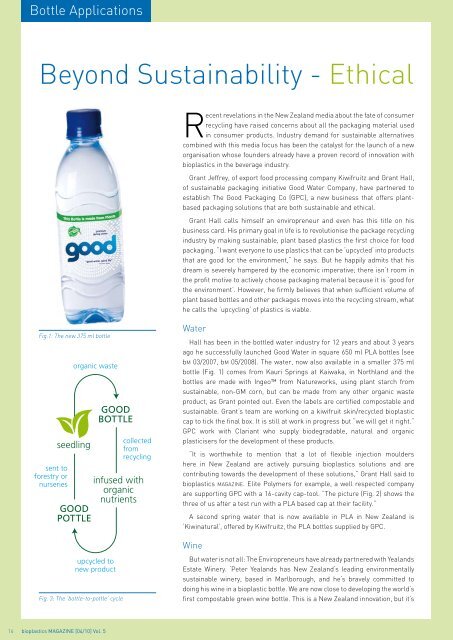04 | 2010
You also want an ePaper? Increase the reach of your titles
YUMPU automatically turns print PDFs into web optimized ePapers that Google loves.
Bottle Applications<br />
Beyond Sustainability - Ethical<br />
Recent revelations in the New Zealand media about the fate of consumer<br />
recycling have raised concerns about all the packaging material used<br />
in consumer products. Industry demand for sustainable alternatives<br />
combined with this media focus has been the catalyst for the launch of a new<br />
organisation whose founders already have a proven record of innovation with<br />
bioplastics in the beverage industry.<br />
Grant Jeffrey, of export food processing company Kiwifruitz and Grant Hall,<br />
of sustainable packaging initiative Good Water Company, have partnered to<br />
establish The Good Packaging Co (GPC), a new business that offers plantbased<br />
packaging solutions that are both sustainable and ethical.<br />
Grant Hall calls himself an enviropreneur and even has this title on his<br />
business card. His primary goal in life is to revolutionise the package recycling<br />
industry by making sustainable, plant based plastics the first choice for food<br />
packaging. “I want everyone to use plastics that can be ‘upcycled‘ into products<br />
that are good for the environment,“ he says. But he happily admits that his<br />
dream is severely hampered by the economic imperative; there isn‘t room in<br />
the profit motive to actively choose packaging material because it is ‘good for<br />
the environment‘. However, he firmly believes that when sufficient volume of<br />
plant based bottles and other packages moves into the recycling stream, what<br />
he calls the ‘upcycling‘ of plastics is viable.<br />
Fig.1: The new 375 ml bottle<br />
Fig. 3: The ‘bottle-to-pottle’ cycle<br />
Water<br />
Hall has been in the bottled water industry for 12 years and about 3 years<br />
ago he successfully launched Good Water in square 650 ml PLA bottles (see<br />
bM 03/2007, bM 05/2008). The water, now also available in a smaller 375 ml<br />
bottle (Fig. 1) comes from Kauri Springs at Kaiwaka, in Northland and the<br />
bottles are made with Ingeo from Natureworks, using plant starch from<br />
sustainable, non-GM corn, but can be made from any other organic waste<br />
product, as Grant pointed out. Even the labels are certified compostable and<br />
sustainable. Grant‘s team are working on a kiwifruit skin/recycled bioplastic<br />
cap to tick the final box. It is still at work in progress but “we will get it right.“<br />
GPC work with Clariant who supply biodegradable, natural and organic<br />
plasticisers for the development of these products.<br />
“It is worthwhile to mention that a lot of flexible injection moulders<br />
here in New Zealand are actively pursuing bioplastics solutions and are<br />
contributing towards the development of these solutions,“ Grant Hall said to<br />
bioplastics MAGAZINE. Elite Polymers for example, a well respected company<br />
are supporting GPC with a 16-cavity cap-tool. “The picture (Fig. 2) shows the<br />
three of us after a test run with a PLA based cap at their facility.“<br />
A second spring water that is now available in PLA in New Zealand is<br />
‘Kiwinatural‘, offered by Kiwifruitz, the PLA bottles supplied by GPC.<br />
Wine<br />
But water is not all: The Enviropreneurs have already partnered with Yealands<br />
Estate Winery. ‘Peter Yealands has New Zealand‘s leading environmentally<br />
sustainable winery, based in Marlborough, and he‘s bravely committed to<br />
doing his wine in a bioplastic bottle. We are now close to developing the world‘s<br />
first compostable green wine bottle. This is a New Zealand innovation, but it‘s<br />
16 bioplastics MAGAZINE [<strong>04</strong>/10] Vol. 5


















